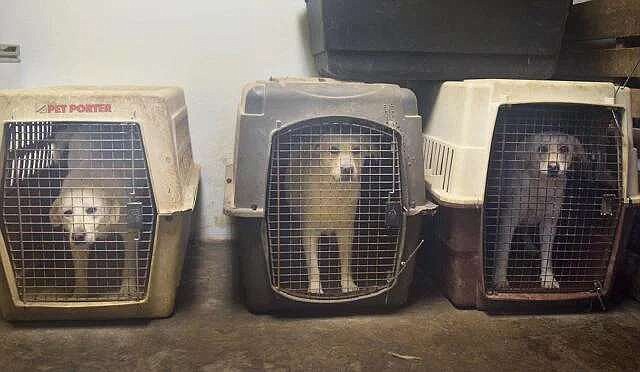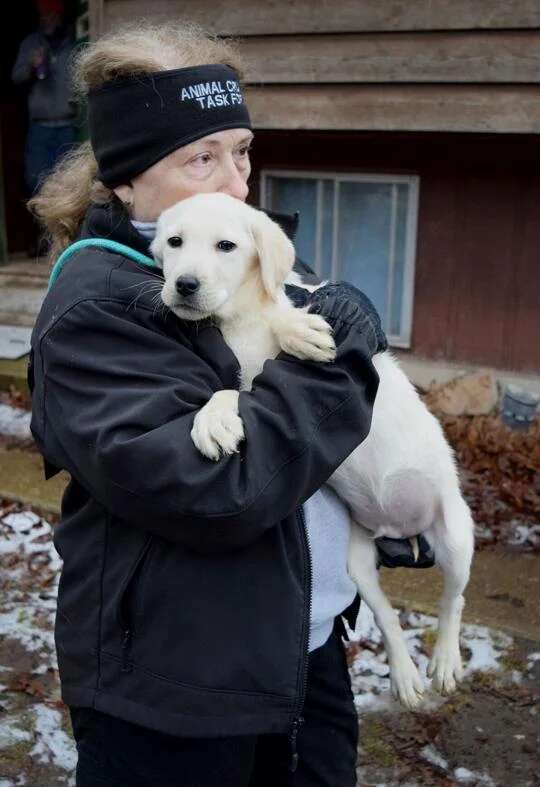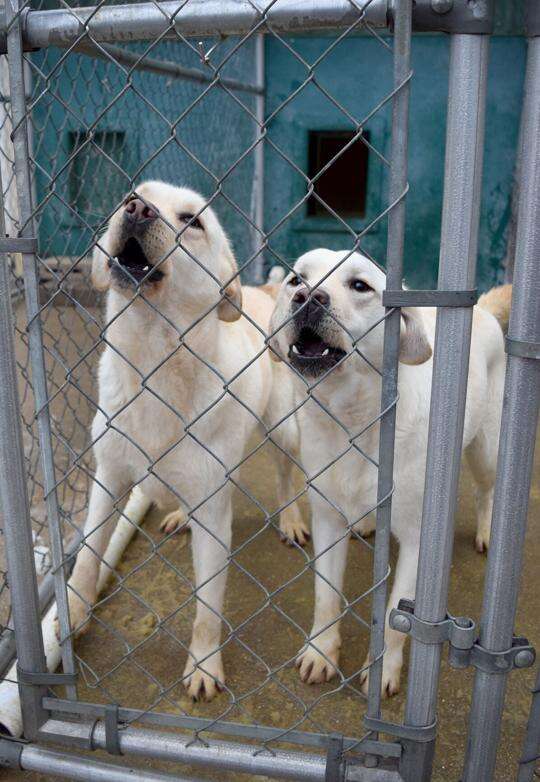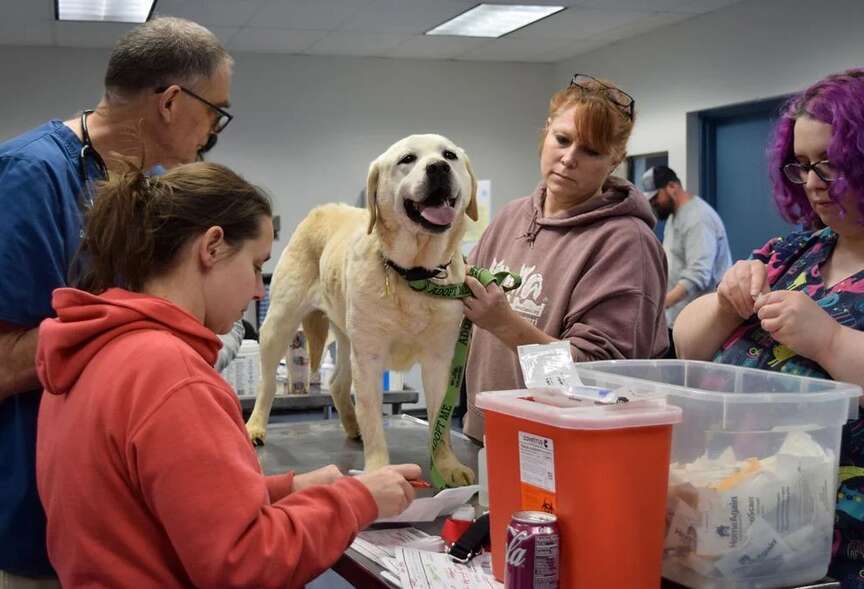In January, the Humane Society of Missouri rescued 55 underfed, neglected dogs from a property in Stone County.
When the Humane Society's Animal Cruelty Task Force arrived, they were met with a horrifying sight: Amid that day's temperatures in the teens, dozens of emaciated dogs were found without food, water or shelter.
The surviving dogs were so malnourished it was hard to tell them apart from the 15 that had already succumbed to starvation.
The rescue came just 10 days after the same Animal Cruelty Task Force rescued 97 dogs from shameful conditions at Sho-Me Labradors, an unlicensed commercial breeding business in Phelps County.
"We have rescues that are happening -- small rescues, big rescues -- all throughout the calendar year," said Ella Frank, director of the Animal Cruelty Task Force.
Missouri has a puppy mill problem. In fact, it's the worst state in the country for commercial breeding enterprises.
Puppy mills are breeding facilities with the goal of churning out as many dogs as fast as possible to make a profit, generally at the expense of healthy living conditions for the dogs.
The Humane Society of the United States' most recent "Horrible Hundred" report found 31 of a selected 100 problematic puppy sellers in the U.S. were located in Missouri.
2023 was the 11th consecutive year the state has topped the list, which is compiled to highlight cruelty and neglect among commercial dog breeders.
While Missouri still has the most puppy mills in the country, it used to be even worse. Before the 2011 Canine Cruelty Prevention Act, Missouri had nearly 2,000 licensed commercial breeders. That number has been more than halved, with around 900 today.
Not every commercial breeder is running a puppy mill, but the sharp decline in businesses in the immediate wake of the act's passing is no coincidence: When living standards for dogs were raised, many businesses gave up voluntarily.
"If there was ever any question how bad the practices were, it was the fact that you pass legislation that just mandated basic care, and half of them just suddenly go out of business," said Bob Baker, executive director of the Missouri Alliance for Animal Legislation. "Because they weren't even willing to do that."
Why Missouri?
Historically, most dog breeders shipped their dogs around the country, and Missouri's central location made it the ideal spot for a high concentration of breeders, Baker said.
In the past, Missouri also had the most lax laws regulating commercial dog breeders in the country, he said.
But the biggest cause was the rise of concentrated animal feeding operations, or CAFOs, Baker said.
These large industrial factory farms, which raise thousands of animals per location in a confined space, came in and put small farmers out of business.
In response, to keep their farms and maintain a stream of revenue, many Missouri farmers began to breed dogs commercially.
"That's why you see all the big agriculture groups always defending the puppy mills," Baker said. "Because so many of the dog breeders are farmers."
Combine the need to keep farming businesses afloat with lax laws and the ideal location, and Missouri started to look very appealing for dog breeding.
"Agriculture has been turned upside down," Baker said. "I mean, they've just been decimated. So they need these jobs."
As an agricultural state, legislators in Missouri aim to appease the agriculture industry, said Kristin Rickman, director of the emergency response team at PETA. And the key to why Missouri has consistently fallen short in dealing with puppy mills is the same reason the people running the mills ignore poor conditions: greed.
"We've got big (agriculture) lobbyists with big money fighting against any advancement in animal protection laws," Rickman said.
These lobbyists believe any protections for dogs would spill into the agriculture industry, meaning legislation would then protect chickens, cows, pigs and other livestock, which are often kept in poor conditions -- and requiring better treatment of livestock would increase operating costs.
Senate Bill 937, recent legislation proposed by Sen. Justin Brown, is an example of legislation aimed at weakening the protections against puppy mills.
Right now, if a pet store is not acting responsibly, the local government has control over that. They can deny the perpetrators the privilege of opening a store and have the authority to take action against them.
Under SB 937, only the state and the USDA would regulate these businesses -- two entities that don't have a great track record of successful regulation.
"The USDA and the state aren't really doing a (good) job on enforcing these things," Baker said.
Why does it persist?
When Missouri's Canine Cruelty Prevention Act passed in 2011, the provisions included adding more money to enforce puppy mill regulations.
"I'm glad that something is being done," Frank said. "Would we like it to be speedier? Yeah, but the bottom line is if it wasn't for (the Missouri Department of Agriculture) doing their job, nothing would be getting done."
Despite the extra money, Baker believes the Missouri Department of Agriculture has been too slow to enforce the laws.
"They take the attitude that, 'We want to work with them. We just don't want to put people out of business,'" he said. "They wait too long to take legal action against these breeders. And it's taken almost 10 years on some of them."
One particular puppy mill, Smith's Kennel in Salem, was listed in the Humane Society of the United States' reports as problematic as far back as 2010, and only just shut down voluntarily in 2023.
"I can understand the first time out there, just give them some warnings, you know, trying to work with them," Baker said. "But time and time and time again. And then they ignore the warnings they get, or they take away their license and they still continue without a license. It's just very, very frustrating."
"If you catch a drug dealer, you don't say, 'Oh, just stop dealing drugs.' You take action, you want to send a message," Baker said.
This cycle has proved to be easily repeatable. The rescue of 97 dogs from Sho-Me Labradors, for example, happened just a few years after the Humane Society removed 83 dogs from the same business in late 2019 and early 2020.
On Jan. 4, Attorney General Andrew Bailey's office obtained a judgment against Sandra Kozlowski, the owner of Sho-Me Labradors, stating that she had "continually and willfully disregarded" a consent judgment from May 2020 after her failure to follow dog breeder regulations.
As her punishment, she was to pay $5,000, which was the amount of the suspended penalties from the May 2020 judgment, have all but 10 dogs taken away by the Humane Society and was no longer allowed to advertise the sale of dogs from her business.
The ease with which breeders ignore initial warnings and continue to abuse their dogs does not sit well with Baker.
"It's much better than it was before 2011, but we have so much more to do, and we just need stricter enforcement," Baker said.
By not taking action quickly, the state is allowing people to continue subjecting animals to brutal conditions.
Current regulations are what Baker calls "survival standards" -- basically, enough that when they're adhered to, dogs will survive. But puppy mills still fail to meet those.
The Stone County rescue found dogs visibly starving. Some were chained to trees and some were living in an outdoor pen in freezing weather.
Most of the 55 recovered dogs were scabbed, scarred or wounded, according to an update post from the Humane Society's website. Many had parasites or suffered from other health problems.
"It's heartbreaking," Frank said. "But then on the other side, you're one of the people that are responsible for them getting out of that nightmare of a situation."
In August, a commercial breeder called Hargis' Sunshine Kennel near Hallsville, was the subject of a USDA investigation that found evidence of problematic conditions.
Records from the facility indicated a dog was recommended treatment for a dental disease that could permanently damage its teeth and gums, but the owner had failed to provide treatment seven months later.
The organization also found wire fences with jagged edges, another dog with an untreated dental disease and a broken floorboard, among other hazards.
"It's gonna be a never-ending battle, but you gotta go in the fight," Baker said.
The work of the Missouri News Network is written by Missouri School of Journalism students and editors for publication by Missouri Press Association member newspapers.




